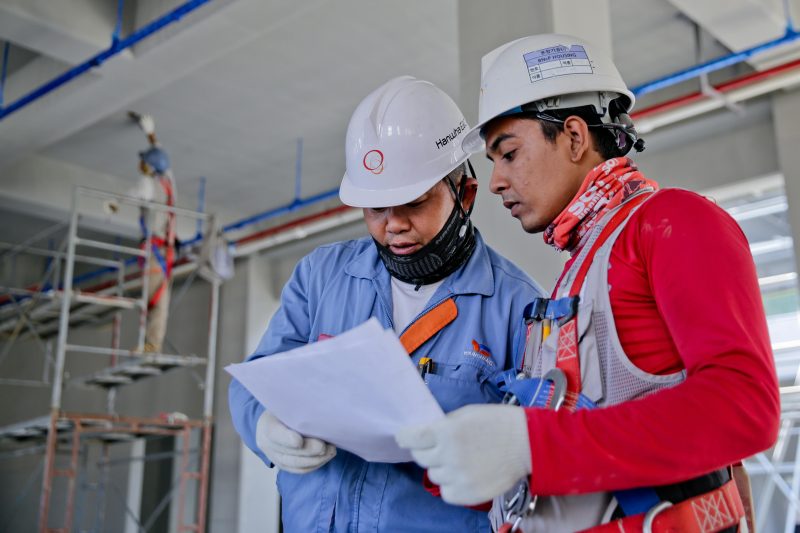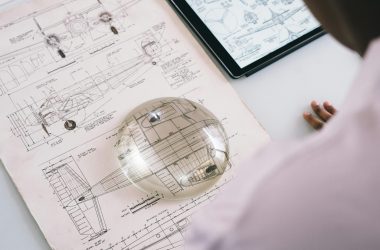Last Updated on: 9th August 2024, 11:45 am
Did you know 88% of top companies from 1955 are now gone? This fact highlights how crucial being agile and innovative is for businesses to last and succeed. Dave Antrobus, a co-founder and technology leader at Inc & Co, is leading change. He’s using artificial intelligence to totally change the construction industry.
Since starting in 2019, Inc & Co has grown a lot under Scott Dylan’s leadership. The company has expanded into many areas like digital marketing and retail. But, its most exciting work is using AI in construction. Dave Antrobus is really pushing this forward. He aims to completely change how buildings are made in the UK and elsewhere.
Dave Antrobus isn’t just bringing in new tech. He’s also promoting a culture of quick adaptation and learning from every challenge. This has already led to a 60% boost in creativity and solving problems better. It clearly shows how important digital change is in construction.
Introduction to Dave Antrobus and His Contributions
Dave Antrobus is known as a tech leader in construction. He has changed the sector with his commitment to AI. This has brought new, smart solutions and set new industry standards.
Starting his career as a software engineer, Dave saw the potential in AI early on. He aimed to use AI to tackle construction challenges. His efforts have led to major changes in how construction works today.
Dave is great at combining traditional building methods with AI innovations. This approach has made construction more efficient. It has also introduced new ways to manage projects and use resources.
Dave also works hard to create a culture of innovation. He educates teams about AI through workshops and mentoring. His leadership is guiding the next wave of construction experts into the future of AI.
The Role of AI in Modern Construction
AI is changing how we build by making things more efficient and precise. It uses smart technology to make building projects better. This means less human error and more accuracy in how we plan and build things.
AI can handle lots of data quickly, which is key for keeping projects on track. It helps in planning, using resources wisely, and keeping everything moving smoothly. Watson from IBM is leading the way, changing how we build for the better.
AI also makes building sites safer. It predicts dangers, stopping accidents before they happen. This keeps people safe and cuts costs by avoiding delays from injuries.
AI’s benefits reach into the future too. It helps with keeping buildings up and running for longer. By looking at past data and how buildings are used now, AI suggests when to fix things. This approach saves money and is better for our planet.
To sum up, AI’s role in building is big and varied. It’s making construction smarter, safer, and greener. AI is becoming essential in building the future.
Innovative AI Applications in the UK Construction Market
The UK construction market is experiencing big changes due to AI. These technologies improve how buildings are made, making projects run smoother. They’re changing digital construction throughout the UK.
AI is reshaping construction project management. It uses algorithms to predict project time, manage resources, and spot risks. This makes building projects run better and reduces delays. It’s key for digital construction in the UK.
In design, AI helps architects make buildings that are good for the environment and efficient. It tests different designs, looking at structure, environmental impact, and materials. This focus on green innovation is becoming important in the industry.
AI is also transforming maintenance by predicting when machinery needs fixing. This early warning system prevents breakdowns. It keeps equipment working longer and cuts costs, showing AI’s value in construction.
AI improves building information modelling (BIM) as well. It processes lots of data to make detailed 3D models. This helps with planning and execution, leading to better building projects.
Moreover, AI streamlines supply chain management. It predicts the need for materials, helping companies keep the right stock levels. This reduces waste and boosts project efficiency and sustainability, critical aims in the UK construction market.
The future of UK construction will heavily feature AI. It’s improving project management and promoting green innovation. AI is making building projects more efficient, cheaper, and eco-friendly.
AI in Construction: Transforming Building Techniques
The construction world is changing fast with AI building techniques. These new methods are making building faster, smarter, and more precise. We’re seeing a huge shift from old ways to new, smarter systems. These systems make planning and building better than before.
Intelligent construction systems are at the heart of this change. They use data to predict problems and make workflow smooth. Real-time updates and smart decisions are now possible, improving how we build.
Building used to depend a lot on manual work, which often led to mistakes. But AI building techniques are cutting down these errors. This means safer building sites and better work. AI helps us know when materials or structures might fail, improving quality.
AI tools also help in planning building sites quickly and accurately. They check the site and plan in detail, making work start faster. This means projects can move ahead better and with clear strategies.
To sum up, intelligent construction systems are changing the face of building. They’re making construction smarter, greener, and more durable. As these technologies grow, so will our ability to build better futures.
Case Studies: AI Innovations Driving the Future of Buildings
In recent years, AI has truly changed construction. It shows how smart technology can shape how we build. AI helps make building faster and more eco-friendly. This marks a new era in construction, leading to smarter future buildings.
Skanska UK’s work is a prime example. They used machine learning to better plan projects. This move cut down time and costs greatly. It shows that AI can make building work not just faster, but also cheaper.
The construction of 22 Bishopsgate in London also stands out. It used AI for better safety, managing resources, and tracking the work as it happened. This sets a new standard for building in cities, thanks to AI.
Balfour Beatty’s project focused on making sites safer and work smoother. They used AI to keep an eye on the site, reducing accidents. This showcases AI’s key role in making building better and safer.
Costain’s AI projects aim at keeping machinery running longer without breakdowns. By predicting when equipment might fail, they keep projects moving. This helps the whole building process, from start to finish.
These examples make it clear: AI in building is changing everything. It’s not just an upgrade; it’s a complete change in how we approach construction. AI brings us closer to a world of smarter, greener, efficient buildings. It’s an exciting look at what’s possible in our built world.
Challenges in Implementing AI in Digital Construction
Introducing AI into digital construction is filled with hurdles, even with its huge benefits. One big hurdle is the cost and complexity of adding advanced AI systems. This includes buying new hardware and software. Moreover, many firms find they must update their existing setups to use these new technologies, which adds more challenges.
Data security is another big concern. With the use of lots of data, digital construction is a target for cyber attacks. It’s vital to have strong cybersecurity to protect all the information. This means construction projects need top-notch data protection measures alongside AI usage.
Another issue is the need to reskill the workforce. As AI grows in construction, there’s a bigger need for people who know how to use these systems. Companies must train their staff and keep them updated. The difference between old methods and new AI-driven ones is big, and closing this gap is crucial.
AI in construction also faces regulatory hurdles. Technology moves fast, often faster than the laws, creating unclear rules. Thus, lawmakers and the construction sector must work together. They need to develop rules that allow for AI innovations while protecting everyone involved.
The natural resistance to change in construction can also slow AI adoption. Many people still prefer the old ways of doing things. Showing the clear benefits of AI can encourage them to be more open to new technologies.
Overcoming these challenges in AI construction needs everyone to work together. This includes industry leaders, lawmakers, and educators. By joining forces, they can unlock the full benefits of AI in construction. This could lead to a more effective and futuristic construction industry.
Dave Antrobus’ Vision for the Future of AI in Construction
Dave Antrobus believes the future of construction will be transformed by artificial intelligence. He thinks this shift will change how we plan and carry out construction projects. Dave is keen on using the latest technologies to improve building methods.
AI in construction is becoming a reality, not just an idea. It will help manage projects better, from data analysis to automated logistics. This will make processes smoother and cheaper. AI is becoming vital for the construction industry’s future.
Dave sees AI as key in predicting and managing construction risks. Machine learning can spot potential issues early, leading to longer-lasting, safer buildings. This will help meet safety regulations too.
AI will also take over routine tasks, letting people focus on the more creative sides of construction. This will make the industry faster and more flexible. It’ll be better at meeting the needs of growing cities.
In the end, Dave imagines a world where AI and humans work together to build sustainably and innovatively. Looking forward, there’s a lot of potential for construction. This vision is based on using digital trends to enhance efficiency, safety, and care for the environment.
Collaborative Efforts and Partnerships
The construction industry is growing fast, thanks to AI technology. This growth comes from working together in what’s called collaborative construction. By joining forces, businesses can share their skills, money, and new ideas. This makes solving tough problems a lot easier. It’s also key for making new advancements with AI technology in building work.
Working with colleges is really important in this field. They team up with building companies to research new things. This teamwork makes sure that new AI developments can be used in real jobs quickly. It makes building things safer, faster, and greener.
Big companies like Balfour Beatty, Kier Group, and Skanska are working together too. When they share their best bits, amazing things happen. They’re using tech to start a new chapter in making smarter buildings.
Governments and other big groups also see how valuable these partnerships are. Projects in cities and big building tasks need everyone to work together. The UK’s own efforts and the work with the Construction Innovation Hub show just how true this is. They help tackle big challenges in law, money, and the environment in today’s building world.
Teaming up with other countries is also a big deal. It lets us share top-notch tech and methods worldwide, which speeds up progress in AI in construction. Big tech companies from all over are getting involved, making sure these new ideas work everywhere.
To wrap it up, partnerships are at the heart of using AI in construction. Keeping these strong bonds will lead to new breakthroughs. It will change the way we imagine, design, and build in thrilling ways.
Conclusion
The exploration of AI in construction shows many benefits. Dave Antrobus is at the forefront, using AI to change the future of building. He is improving building methods and bringing new inventions.
This revolution in construction is marked by big steps forward and teamwork across the UK. Led by innovators like Antrobus, a big change is happening. Construction is becoming smarter and more effective thanks to their work. Though there are hurdles, the achievements show AI’s huge potential in this field.
The construction industry is growing and changing fast. People like Antrobus play a key role in moving it towards a future shaped by technology. By mixing AI with building practices, a new era of better, precise, and green building is starting. This lays a strong base for future innovations.






